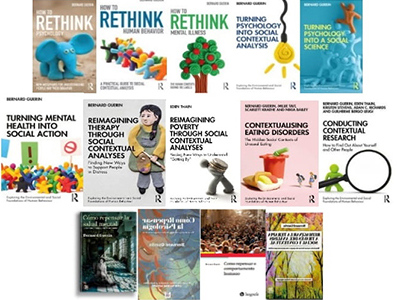The latest books from UniSA researchers
Exploring the Environmental and Social Foundations of Human Behaviour (book series)
Edited by Professor Bernard Guerin, a member of UniSA’s Safe Relationships and Communities Research Group. Authors include UniSA staff Bernard Guerin and Eden Thain; UniSA tutor and PhD student Adan Richards; former UniSA tutors and PhD graduates Kristen Stevens and Guilherme Leugi; UniSA honours graduates Millie Tait, Scarlett Kraehe, Nikia Bailey; and UniSA masters student Nikia Bailey.

Can you imagine that everything people do, say, think and feel is shaped directly by engaging with our many environmental and social contexts? Treating humans as part of their environments.
For current psychology, however, people are said to only engage with metaphorical ‘internal’ environments and everything we do somehow originates from the brain.
But what if all that we do and think originated out in our worlds, and what we call the ‘internal’ human is merely language and conversations which were also shaped by engaging in our external discursive, cultural and societal environments?
Exploring the Environmental and Social Foundations of Human Behaviour explores human behaviour as directly engaged with the world. It is about developing the next generation of ways to understand what people do, say, think and feel.
To achieve this, you must understand all the diverse contexts of resources, social relationships, economics, culture, discourses, colonisation, patriarchy, society, and the opportunities afforded by our birth contexts. Even language and thinking arise from our external social and discursive contexts, and the ‘internal’ and brain metaphors will disappear as psychology becomes merged with the social sciences. The brain does not originate our behaviour even though it participates.
The book series covers how to rethink psychology by integrating the social sciences as a new domain; reinventing research methods for doing contextual research; rethinking what is currently called ‘mental health’; a contextual exploration of therapy itself and what therapy should look like in the future; the social worlds of poverty; eating disorders; and much more. There are four translations into Spanish and Portuguese.
The series comprises the following titles:
How to Rethink Psychology: New metaphors for understanding people and their behaviour
How to Rethink Human Behaviour: A Practical Guide to Social Contextual Analysis
How to Rethink Mental Illness: The Human Contexts Behind the Labels
Turning Psychology into Social Contextual Analysis
Turning Psychology into a Social Science
Turning Mental Health into Social Action
Reimagining Poverty through Social Contextual Analyses: Finding New Ways to Understand ‘Getting By’
Contextualising Eating Disorders: The Hidden Social Contexts of Unusual Eating
Conducting Contextual Research: How to Find Out About Yourself and Other People
The book series is available from Routledge.
UniSA staff and students can access the books for free via this link courtesy of the UniSA Library.
Other Stories
- Nutbush fever: How the Tina Turner hit became Australia's dance sensation
- Technology digs into need to send humans into mines
- End of the line for P&O: why is Australia such a tough market for the cruise ship industry?
- New Adelaide University to operate $60m defence academy
- From the Acting Vice Chancellor
- Achievements and Announcements
- Increased risk of homelessness for youth leaving out-of-home care
- UniSA helping the next generation of leaders from Papua New Guinea
- In Pictures: MOD. party and National Reconciliation Week
- The latest books from UniSA researchers




